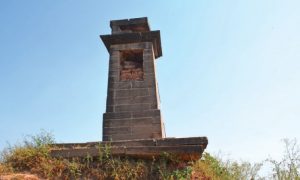Archaeologists study surviving historical relics scattered across Islamabad, Pakistan, before they are lost to housing development. They have managed to document remains of a Mughal era mosque, a British era memorial and many more.

A survey was carried out throughout four zones of Islamabad by the Department of Archaeology and Museums in order to protect and document relics before they are destroyed by spreading house development. The survey was conducted for the first time. The experts surveyed Kuri in Zone IV documenting a few thousands of pottery pieces scattered around a few documented sites from Buddhist, Muslim, Sikh and British eras. One of the most important finds was a ten metre wide entrance to a mosque that is thought to have been built during the Mughal era and a Buddhist structure from the 6th or 7th century AD with stone masonry similar to that found in the Taxila Valley. Moreover a monument of a British battle of the locals was found in form of a 3-metre-tall obelisk, similar to that of Nicholson’s Monument on GT Road, near Taxila. Near Chhappran Village a rock shelter and two mounds have also been found and are believed to date back to between the 2nd and 5th century AD.

(after Dawn)